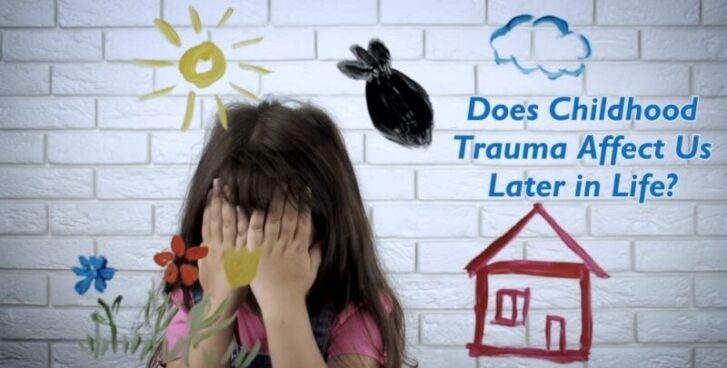Thinking back to one’s childhood often conjures up impressions of purity, delight, hope, and excitement. It is a phase characterized by safety and a period of feeling cherished and shielded. The sense of security obtained from knowing that your family protects you forms the basis for establishing strong and secure bonds in the future.
This represents the typical concept and experience of childhood. However, the actual experiences of numerous children and the subsequent impacts on their adult lives significantly deviate from this idealistic notion.
Key Takeaways
- Enduring Effects: Childhood trauma can significantly affect mental and physical health, and relationship-building abilities in adulthood.
- Impact on Relationships and Self-Image: Traumatic experiences in childhood often lead to difficulties in forming healthy relationships and can negatively affect self-esteem and identity.
- Support and Coping: A strong support system and effective coping mechanisms play a crucial role in how a child deals with trauma and its long-term effects.
- Healing Through Therapy: Therapies like CBT, EMDR, and Somatic Experiencing are vital for processing and healing from childhood trauma.
- Individual Responses: The impact of childhood trauma varies greatly depending on several factors, including the nature of the trauma, the child’s age, and the available support.
| Symptoms | Description |
|---|---|
| Anxiety | Adults who have experienced childhood trauma usually have heightened levels of anxiety. They may worry excessively and have trouble managing their anxiety. |
| Depression | It can lead to persistent feelings of sadness, lack of interest in activities, and difficulty experiencing pleasure. |
| Post-Traumatic Stress Disorder (PTSD) | Adults who experienced traumatic events as children may have recurring nightmares, and flashbacks, or may feel a like they’re in a constant state of danger. |
| Difficulty Forming Relationships | Adults with a history of it may struggle to establish and maintain healthy relationships due to having trust issues and fear of being hurt. |
| Substance Abuse | Individuals may use drugs or alcohol as a coping mechanism to deal with unresolved issues. |
| Dissociation | Some may experience periods of dissociation, feeling disconnected from themselves or the world around them. |
| Emotional Regulation Issues | Adults may have difficulty regulating emotions, leading to emotional outbursts, difficulty calming down after being upset, or trouble identifying their emotions. |
| Physical Health Problems | There’s a higher risk for chronic conditions such as heart disease, diabetes, ear problems, and autoimmune diseases among adults who had bad experiences in their childhood. |
| Low Self-Esteem | It can leave adults with feelings of worthlessness or inadequacy. |
| Sleep Disorders | Insomnia, nightmares, or other sleep disorders may be more common in adults who experienced bad stuff. |
Impact of Childhood Trauma: The Unseen Wounds
Childhood trauma can manifest in may ways. It can take the form of physical or sexual harm, being a bystander to a horrifying incident, experiencing severe illnesses that require extensive medical interventions, witnessing acts of domestic violence, enduring relentless bullying, or even surviving those conditions such as displacement and catastrophic natural disasters.
The understanding of such incidents is especially complex for a child, who lacks the brain capacity of adults. Children have a harder time with or lack of education, socialization, life experience than adults. They often fall into the pit of self-blame, unable to comprehend the causes and consequences of these distressing events.
The Lasting Impact: Loss of Self, Guilt, and Shame
The damaging effects of it can lessen a child’s sense of stability and self-identity, leaving lasting scars that persist into adulthood. This can lead to feelings of guilt and shame, feelings of disconnection, difficulties in managing emotions, heightened anxiety and depression, and bouts of anger. Some kids might even have dreams about their parents dying and it can drift them away, as they don’t understand the meaning behind it.
In a situation where a child is repeatedly subjected to trauma, disrupting their sense of safety and stability. This is often known as complex trauma. If a child suffers emotional, physical, or sexual abuse from a caregiver, it deeply affects how they form relationships later in life.
Their faith in caretakers and protectors is left shattered, leading to a strong sense of distrust and fear. It may cause a child’s sense of identity to break apart, and it takes significant time and effort to mend these cracks and restore their trust.
In such circumstances, it becomes essential to provide supportive and a therapeutic environment for these children to help them navigate their emotional landscape. It’s crucial to recognize the signs and offer appropriate professional help.
it is important to note that healing is not just about curing visible wounds; it’s also about understanding and addressing the pain that hides beneath the surface. By gaining this understanding, we can help children build resilience and rewrite their future, allowing them to overcome their past and move towards a healthier, happier life.
What Determines How a Child Reacts to Trauma?
Several factors may determine how a child reacts. These include:
- Age: A child’s age at the time of the traumatic event can significantly influence their reaction. Younger children may not fully understand the event, which often leads to confusion and fear. On the other hand, older children might be more likely to experience feelings of guilt or responsibility.
- Type: The nature of the traumatic event (e.g., traumatic event, accident, abuse, neglect) can also impact a child’s reaction. Certain types of trauma, especially those involving a personal violation or prolonged exposure, may lead to more severe or long-lasting effects.
- Severity and Duration: The severity of the traumatic event and how long it lasts can influence a child’s response. A single, brief traumatic event might have different effects compared to a recurring or prolonged one.
- Proximity: Children who directly experience or witness a traumatic event are likely to have a more significant reaction than those who are more removed from the event.
- Personality: Just like adults, every child has a unique personality, which can impact how they respond. Some children might be naturally more resilient or have better-coping mechanisms due to their personality traits.
- Support System: The presence of a strong, supportive network, including family, friends, and community, can significantly influence how a child copes with trauma. Supportive adults can help children understand and process their feelings, which can contribute to a more positive outcome.
- Previous Trauma or Stress: Children who have previously experienced high levels of stress may be more vulnerable to the effects of a new traumatic event.
- Coping Skills: A child’s ability to cope with stress and adversity plays a significant role in their reaction. Those with strong problem-solving skills and adaptive coping strategies are generally better able to manage their responses to traumatic events.
It’s important to note that these are general factors, and every child’s response to trauma is unique. If a child is showing signs of trauma, professional help, such as a child psychologist or psychiatrist, should be sought after.
Click here to check out the top picks on supplements for skinny people.
Adult Attachment Issues Rooted in Childs Experiences
In the complex web of life, traumatic childhood experiences, particularly those inflicted by guardians or parents, can spin off into a web of attachment issues in one’s adult life. Here’s a closer look at a few of these threads:
- The Solitary Fortress Syndrome (Dismissive-Avoidant Attachment): Picture a child, neglected or rejected by those meant to care for them. As they grow, they build high walls around themselves, becoming an island of self-sufficiency. Their fortress is a shield, protecting them from the pain of rejection they’ve experienced before.
- The Shadow of Suspicion (Fearful-Avoidant Attachment): In the murkier corners of childhood, where abuse and neglect lurk, grow seeds of suspicion and apprehension about intimacy and close relationships. These children, now adults, grapple with trust like a slippery eel. Emotion is a language they find hard to speak, and they often seem like distant islands in the sea of relationships.
- The Validation Voyage (Anxious-Preoccupied Attachment): Childhood, for some, is a roller coaster ride of emotional care, peaks of affection interspersed with valleys of rejection. As adults, these individuals are on an eternal quest for validation in relationships. It’s like they are adrift at sea, always looking for the lighthouse of reassurance, uncertain about their own importance in the constellation of relationships.
The Ripple Effects of Childhood Trauma
The repercussions of childhood trauma are complex and varied, heavily influenced by the specific trauma and individual characteristics of the child. When a child’s home becomes a battlefield instead of a haven, they often resort to creating their survival strategies.
They might live in constant fear, hyper-aware of the moods and reactions of their volatile caregivers. To maintain peace, these children learn to suppress their emotions, thereby becoming proficient at hiding their fears, anger, and sadness.
Research by the National Child Traumatic Stress Network emphasizes the connection between trauma and high-risk behaviors in adulthood, such as smoking, unprotected sex, and susceptibility to chronic illnesses like heart disease and cancer. Those who’ve suffered abuse are likely to endure persistent stress and anxiety, triggering physical symptoms and emotional problems that span a lifetime.
Essentially, the impact of childhood trauma sets up a fragile foundation that affects an individual’s trajectory in life. Our upbringing, with its inherent sense of security (or lack thereof), significantly influences the emotional and, at times, the physical journey we embark on as adults.
How trauma affects adulthood relationships?
It can have profound and long-lasting effects on adult relationships. Here are some ways it can impact an individual’s ability to form and maintain relationships:
- Trust Issues: Childhood trauma, particularly if it was caused by a caregiver, can lead to trust issues. A person may find it difficult to believe that others have any good intentions, fearing they might be hurt or betrayed as they were in their childhood.
- Attachment Issues: Traumatic experiences in childhood can lead to insecure attachment styles in adulthood. This may manifest as a fear of abandonment, resulting in clinginess in relationships (anxious attachment), or as a fear of intimacy, leading to emotional detachment and self-isolation (avoidant attachment).
- Difficulty with Emotional Regulation: Childhood trauma can make it hard for an individual to manage their emotions effectively. This can lead to volatile relationships, with frequent emotional outbursts, or conversely, to emotional numbness and inability to express feelings.
- Low Self-Esteem: If a person has been traumatized in their early years, they might struggle with feelings of low self-worth. This can cause them to settle for unhealthy relationships, as they may feel they don’t deserve better.
- Communication Issues: Trauma in childhood can also impact a person’s ability to communicate their needs, desires, and feelings and to answer simple questions effectively. This can lead to misunderstanding and conflict in adult relationships.
- Fear of Rejection or Abandonment: Childhood trauma can instill a deep-seated fear of being rejected or abandoned. This fear might make it challenging for them to fully engage in a relationship, worrying that the other person will leave them.
- Physical Intimacy Problems: If the childhood trauma involved physical or sexual abuse, it could cause difficulties with physical intimacy in adult relationships.
Remember, while these impacts can be severe, they are not determinative. Many people with a history of childhood trauma can and do establish healthy relationships in adulthood, often with the help of therapy or other forms of support. Individuals with these experiences must seek professional help if they’re struggling with their relationships due to past trauma.
Therapy Techniques for Healing Childhood Trauma in Adults
Several therapeutic approaches have been found to be effective in helping adults heal from childhood trauma. Here are some of them:
- Cognitive Behavioral Therapy (CBT): This therapy helps individuals understand and change thought patterns that lead to harmful behaviors or emotional distress. CBT can help a person recognize and alter inaccurate or negative thinking, allowing them to view challenging situations more clearly and respond to them more effectively.
- Eye Movement Desensitization and Reprocessing (EMDR): EMDR is a form of psychotherapy that helps people heal from the symptoms and emotional distress resulting from traumatic life experiences. It involves recalling traumatic experiences while receiving bilateral sensory input, such as side-to-side eye movements.
- Somatic Experiencing: This approach focuses on the body’s responses to trauma, to release the physical tension that remains in the aftermath of the traumatic event.
- Cognitive Behavioral Therapy (TF-CBT): TF-CBT is a specific type of CBT that helps individuals who have experienced trauma to learn effective ways to cope with and manage their emotional and behavioral responses.
- Dialectical Behavior Therapy (DBT): DBT helps individuals manage painful emotions and develop healthier coping mechanisms. It includes aspects of mindfulness, emotional regulation, distress tolerance, and interpersonal effectiveness.
- Narrative Therapy: This therapeutic technique encourages individuals to rely on their skills to minimize problems that exist in their lives. Through narrative therapy, individuals can examine their life stories and rewrite or reframe aspects that have been influenced by childhood trauma.
- Psychoeducation: This approach involves teaching individuals about the nature of trauma, its effects, and strategies for self-care. It can be beneficial in reducing feelings of isolation and misunderstanding related to one’s experiences.
- Mindfulness and Relaxation Techniques: Practices like meditation, progressive muscle relaxation, yoga, and other mindfulness techniques can help manage symptoms related to trauma and promote overall emotional and physical well-being.
Remember, different approaches work for different individuals, and it’s often a combination of techniques that proves to be most effective. It’s also crucial that the therapy be administered by a licensed and experienced mental health professional, and that the individual feels safe and comfortable with their therapist. The therapeutic relationship itself is a critical component of the healing process.
FAQ
Final Words
In summary, childhood, often idealized as a time of innocence and joy, can also be marred by trauma with lasting effects into adulthood. This trauma can lead to mental health issues, relationship difficulties, and a weakened sense of self.
Factors such as the nature of the trauma, age at exposure, and available support systems play a crucial role in influencing a child’s response to traumatic experiences. Healing from such trauma is complex but essential, involving therapeutic approaches like Cognitive Behavioral Therapy and EMDR.
Addressing both visible and emotional scars is crucial for building resilience and enabling individuals to overcome their past and embrace a healthier future.
Related Posts:
- Acute Abdominal Pain in Adults: Evaluation and Diagnosis
- How Many Neutrons Does Magnesium Have? Find Out How…
- High Functioning Bipolar Disorder - How It Affects…
- Art Therapy for Post-Traumatic Stress Disorder: The…
- How Does Acupuncture Work? Harnessing the Healing Potential
- How Do You Fix a Leaking Gut: Gut Healing Simplified
















